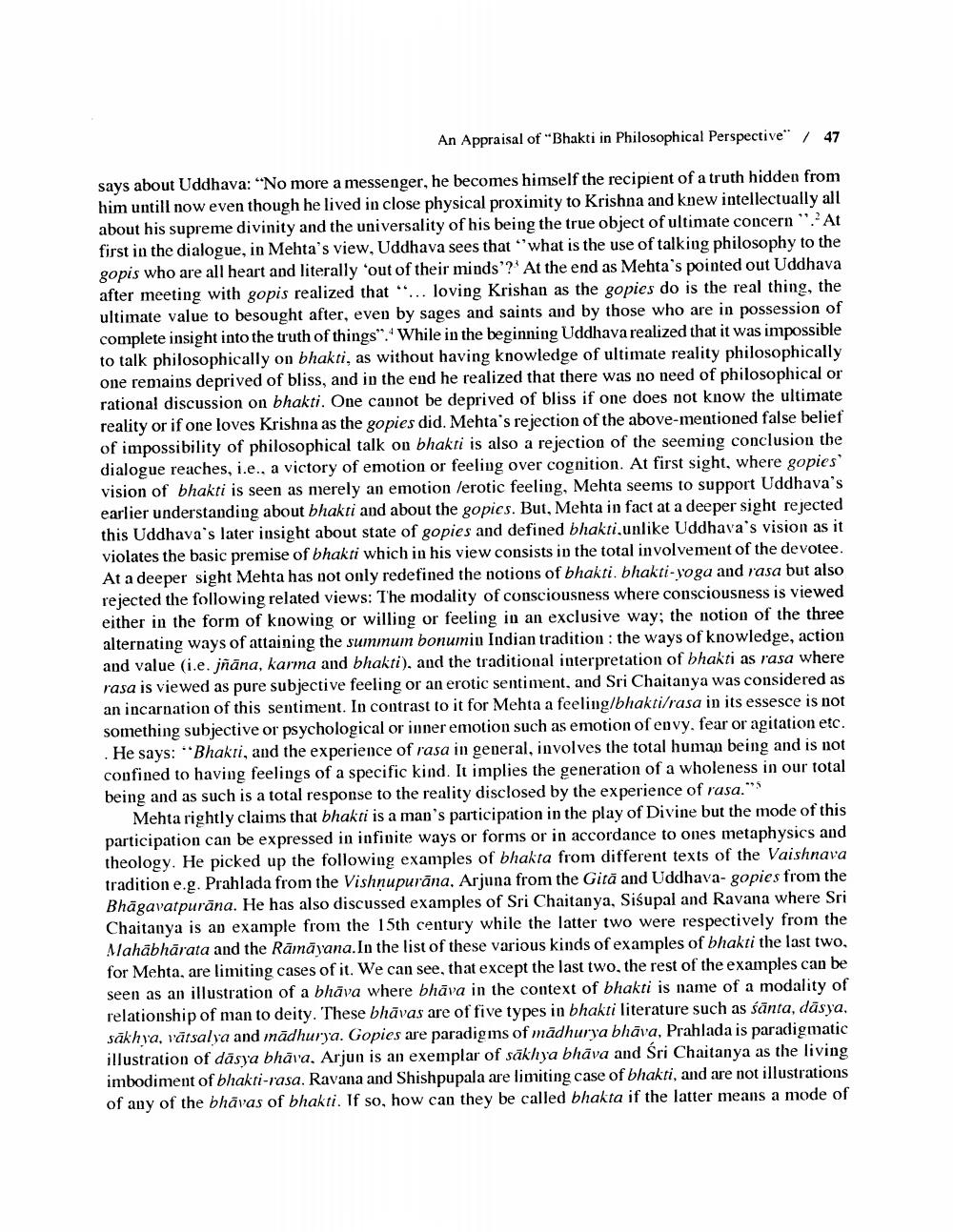________________
An Appraisal of "Bhakti in Philosophical Perspective" /
47
says about Uddhava: “No more a messenger, he becomes himself the recipient of a truth hidden from him untill now even though he lived in close physical proximity to Krishna and knew intellectually all about his supreme divinity and the universality of his being the true object of ultimate concern". At first in the dialogue, in Mehta's view, Uddhava sees that what is the use of talking philosophy to the gopis who are all heart and literally 'out of their minds'?' At the end as Mehta's pointed out Uddhava after meeting with gopis realized that "... loving Krishan as the gopies do is the real thing, the ultimate value to besought after, even by sages and saints and by those who are in possession of complete insight into the truth of things". While in the beginning Uddhava realized that it was impossible to talk philosophically on bhakti, as without having knowledge of ultimate reality philosophically one remains deprived of bliss, and in the end he realized that there was no need of philosophical or rational discussion on bhakti. One cannot be deprived of bliss if one does not know the ultimate reality or if one loves Krishna as the gopies did. Mehta's rejection of the above-mentioned false belief of impossibility of philosophical talk on bhakti is also a rejection of the seeming conclusion the dialogue reaches, i.e., a victory of emotion or feeling over cognition. At first sight, where gopies vision of bhakti is seen as merely an emotion lerotic feeling, Mehta seems to support Uddhava's earlier understanding about bhakti and about the gopies. But, Mehta in fact at a deeper sight rejected this Uddhava's later insight about state of gopies and defined bhakti unlike Uddhava's vision as it violates the basic premise of bhakti which in his view consists in the total involvement of the devotee. At a deeper sight Mehta has not only redefined the notions of bhakti. bhakti-yoga and rasa but also rejected the following related views: The modality of consciousness where consciousness is viewed either in the form of knowing or willing or feeling in an exclusive way; the notion of the three alternating ways of attaining the summum bonumin Indian tradition: the ways of knowledge, action and value (i.e. jñāna, karma and bhakti), and the traditional interpretation of bhakti as rasa where rasa is viewed as pure subjective feeling or an erotic sentiment, and Sri Chaitanya was considered as an incarnation of this sentiment. In contrast to it for Mehta a feeling/bhakti/rasa in its essesce is not something subjective or psychological or inner emotion such as emotion of envy, fear or agitation etc. . He says: Bhakti, and the experience of rasa in general, involves the total human being and is not confined to having feelings of a specific kind. It implies the generation of a wholeness in our total being and as such is a total response to the reality disclosed by the experience of rasa."
Mehta rightly claims that bhakti is a man's participation in the play of Divine but the mode of this participation can be expressed in infinite ways or forms or in accordance to ones metaphysics and theology. He picked up the following examples of bhakta from different texts of the Vaishnava tradition e.g. Prahlada from the Vishnupurāna, Arjuna from the Gitä and Uddhava- gopies from the Bhagavatpurāna. He has also discussed examples of Sri Chaitanya, Sisupal and Ravana where Sri Chaitanya is an example from the 15th century while the latter two were respectively from the Mahābhārata and the Rāmāyana. In the list of these various kinds of examples of bhakti the last two, for Mehta, are limiting cases of it. We can see, that except the last two, the rest of the examples can be seen as an illustration of a bhāva where bhāva in the context of bhakti is name of a modality of relationship of man to deity. These bhāvas are of five types in bhakti literature such as śānta, dāsya, sākhya, vatsalya and mādhurya. Gopies are paradigms of mădhurya bhāva, Prahlada is paradigmatic illustration of dāsya bhāva, Arjun is an exemplar of sākhya bhāva and Sri Chaitanya as the living imbodiment of bhakti-rasa. Ravana and Shishpupala are limiting case of bhakti, and are not illustrations of any of the bhāvas of bhakti. If so, how can they be called bhakta if the latter means a mode of




